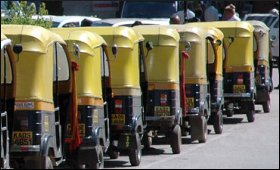|

|
Delhi commuters suffer as autos, taxis strike against app-based cabs
|
|

|
|
| Top Stories |
 |
|
|
|
SME Times News Bureau | 27 Jul, 2016
Thousands of Delhi commuters had a harrowing time on Tuesday as around one lakh drivers of auto-rickshaws and taxis went on an indefinite strike. The Delhi government termed the strike a "sponsored hooliganism" by the Bharatiya Janata Party.
The protesters said the indefinite strike was against the increasingly popular app-based taxi services and threatened to sit on a hunger strike from Wednesday.
About 90,000 auto-rickshaws and 15,000 traditional yellow-top taxis ply in Delhi. Union leaders said almost all of them joined the crippling protest on Tuesday. Not long ago, the autorickshaw drivers were the mainstay of the ruling Aam Aadmi Party's campaigns and poster wars against the central government.
Only a few auto-rickshaws plied, but mostly within residential areas. The yellow-top taxis remained off the roads.
Harried commuters -- who otherwise rely on auto-rickshaws for their daily commute -- had to fall back on overcrowded Delhi Metro or irregular Delhi Transport Corporation and cluster buses on Tuesday.
The worst hit were those reaching the capital by train, as auto-rickshaw and taxi drivers staged noisy protests outside railway stations.
The Delhi government refused to talk to the strikers until the protest was withdrawn.
"We know who (all) are behind the strike; this is sponsored hooliginasim by the BJP," Delhi Transport Minister Satyendra Jain said.
"This is unacceptable," Jain said, adding, "They can't go on strike just like this. Today, they are ranged against app-based cabs; tomorrow they will protest against e-rickshaws and Metro."
"We had made alternate transport arrangements near major bus terminals and railway stations so that commuters don't face problems," he added.
Asked about the auto-rickshaw drivers' demands for rules to govern app-based cab aggregators, Jain said: "The matter concerns the central government; they can bring a bill on the issue."
Meanwhile, the situation is likely to worsen in days to come as a Joint Action Committee of Auto and Taxi Unions (JACATU) vowed to sit on a hunger strike from Wednesday if the Delhi government didn't meet their demand.
"This time, we will show our power to the government. We want the government to fix the rates of these app-based taxi services," JACATU President Rajendra Soni told agency.
The steadily increasing numbers of app-based taxis, particularly from Ola and Uber, have cornered a lot of business of operators of auto-rickshaws and yellow-top taxis.
"Earlier, we earned Rs 1,500-Rs 2,000 daily. But since these taxis have come, we make only Rs 300-Rs 500. Who is to be blamed but the app-based taxis?" said Soni.
Even before the app-based services were introduced, auto-rickshaws had lost a chunk of business to the Delhi Metro.
Sanjay Chawla, president of another auto-rickshaw union, said the Delhi government must fix rates for the app-based taxi services "so that they do not harm our business".
"As of now, opertors of these cabs advertise their rates at Rs 6-7 per km but charge Rs 14-15. By doing this, they woo our customers and hurt our business," he said.
The Delhi government said it had deployed 300 buses to ferry people from railway stations but it was clearly not enough.
Delhi Transport Corporation spokesperson R.S. Minhas said, "Following the auto-rickshaw and taxi strike, we increased the number of buses in the city."
"There was heavy rush in public transport buses," he added.
Delhi's Joint Commissioner of Police (Traffic) Garima Bhatnagar said there was a heavy rush in buses and the Metro due to the strike. She said no case of violence had been reported during the day.
But people reported stray incidents of attacks on auto-rickshaws which defied the strike. In most cases, however, the strikers stopped auto-rickshaws plying on the roads and ordered the passengers out.
Sandeep Roshan, who works with a law firm, said he opted for Metro because he feared Ola and Uber would charge more due to high demand.
Triveni Sood, a public relations executive, too preferred the Metro to travel from Sultanpur from Munirka. Normally, she said, she takes an auto-rickshaw to commute.
The Delhi Metro said: "We keep monitoring the rush. If there is extra rush, we will increase the frequency of trains," a Metro official said.
In the evening, the Delhi Metro said around 38 thousand additional commuters used its service during the day.
"As compared with Monday's 23.10 lakh commuters, 23.48 lakh travellers used the Metro on Tuesday," a DMRC official said.
|
|
|
| |
|
|
|
|
|
|
|
|
|
|
|
|
|
|
| |
| Customs Exchange Rates |
| Currency |
Import |
Export |
US Dollar
|
66.20
|
64.50 |
UK Pound
|
87.50
|
84.65 |
Euro
|
78.25
|
75.65 |
| Japanese
Yen |
58.85 |
56.85 |
| As on 13 Aug, 2022 |
|
|
| Daily Poll |
 |
 |
| PM Modi's recent US visit to redefine India-US bilateral relations |
|
|
|
|
|
| Commented Stories |
 |
|
|
|
|
|
| |
|